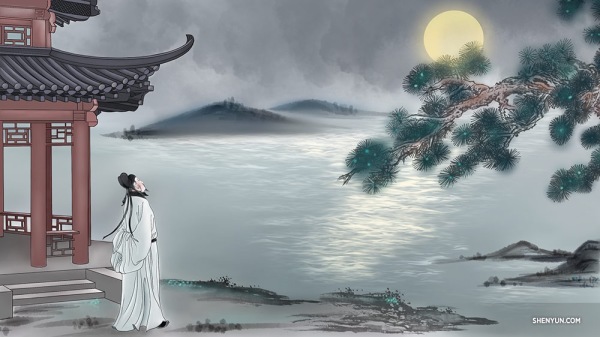
詩仙李白的《靜夜思》,流傳千古。(圖片來源:神韻藝術團官網)
送友人
青山橫北郭,白水饒東城。
此地一為別,孤蓬萬里征。
浮雲遊子意,落日故人情。
揮手自茲去,蕭蕭班馬鳴。
TAKING LEAVE OF A FRIEND
Blue mountains lie beyond the north wall;
Round the city’s eastern side flows the white water.
Here we part, friend, once forever.
You go ten thousand miles, drifting away
Like an unrooted water-grass.
Oh, the floating clouds and the thoughts of a wanderer!
Oh, the sunset and the longing of an old friend
We ride away from each other, waving our hands,
While our horses neigh softly, softly....
這首送別詩,充滿詩情畫意;詩人與友人策馬辭行,情意綿綿。「孤篷」,篷是植物篷草,遇風吹散,詩裡借喻遊子,譯者譯為an unrooted water-grass,很好。「班馬」,與其它馬脫離的馬。
怨情
美人捲珠簾,深坐蹙蛾眉。
但見淚痕濕,不知心恨誰。
THE NIGHT OF SORROW
A lovely woman rolls up
The delicate bamboo blind.
She sits deep within,
Twitching her moth eyebrows.
Who may it be
That grieves her heart?
On her face one sees
Only the wet traces tears.
這首五言絕句,以描寫一位美人的神態,表現她的哀怨之情。「珠簾」,有珠子鑲嵌的簾子,應是bead curtain,並非bamboo blind(竹簾)。「深坐」,久久呆坐。「蛾眉」:delicate eyebrows; long slender eyebrows,直譯為moth eyebrows,缺乏美感,有些肉麻。
夜靜思
床前明月光,疑是地上霜。
舉頭望明月,低頭思故鄉。
ON A QUIET NIGHT
I saw the moonlight before my couch,
And wandered if it were not the frost on the ground.
I raised my head and looked out on the mountain moon,
I bowed my head and thought of my far-off home.
這首小詩,用敘述的語氣,寫遠離故鄉之情,意味深長,耐人尋繹。「夜靜思」:靜靜的夜裡產生的思緒。「床」不譯作bed,譯成couch。「明月」譯作the mountain moon,意為明月清晰,隱約可見月球上的山脈。
金陵酒肆留別
風吹柳花滿店香,吳姬壓酒喚客嘗,
金陵子弟來相送,欲行不行各盡觴。
請君試問東流水,別意與之誰短長。
PARTING AT A TAVERN OF CHIN-LING
The wind blows the willow bloom and fills the whole tavern with fragrance
While the pretty girls of Wu bid us taste the new wine.
My good comrades of Chin-ling, hither you have come to see me off.
I, going, still tarry; and we drain our cups evermore.
Pray ask the river, which is the longer of the two—
It’s east-flowing stream, or the thoughts of ours at parting?
這是李白即將離別金陵(今江蘇省南京市)東遊揚州時留贈友人的送別詩。「留別」,臨別時贈詩給送行者。「吳姬」,吳地的青年女子,這裡指酒店中的侍女。「壓酒」,新酒釀熟時,壓緊榨床取酒。「金陵子弟」譯作good comrades of Chin-ling,意為志同道合的金陵好朋友。「欲行」的是李白,「不行」的是金陵子弟,並非李白欲行又止。
長干行
妾髮初覆額,折花門前劇。
郎騎竹馬來,遶床弄青梅。
同居長干里,兩小無嫌猜。
十四為君婦,羞顏未嘗開。
低頭向暗壁,千喚不一回。
十五始展眉,願同塵與灰。
常存抱柱信,豈上望夫臺。
十六君遠行,瞿塘灩澦堆。
五月不可觸,猿聲天上哀。
門前遲行跡,一一生綠苔。
苔深不能掃,落葉秋風早。
八月蝴蝶黃,雙飛西園草。
感此傷妾心,坐愁紅顏老。
早晚下三巴,預將書報家。
相迎不道遠,直至長風沙。
A LETTER FROM CHANG-KAN
I would play, plunking flowers by the gate,
My hair scarcely covered my forehead, then.
You would come, riding on your bamboo horse,
And loiter about the bench with green plums for toys.
So we both dwelt in Chang-kan town,
We were two children, suspecting nothing.
At fourteen I became your wife,
And so bashful that I could never bare my face,
But hung my head, and turned to the dark wall;
You would call me a thousand times,
But I could not look back even once.
At fifteen I was able to compose my eyebrows,
And beg you to love me till we were dust and ashes.
You always kept me the faith of Wei-sheng,
Who waited under the bridge, unafraid of death,
I never knew I was to climb the Hill of Wang-fu
And watch for you these many days.
I was sixteen when you went on a long journey
Traveling beyond the Keu-Tang Gorge,
Where the giant rocks heap up the swift river,
And the rapids are not passable in May.
Did you hear the monkeys wailing
Up on the skyey hight of the crags?
Do you know your foot-marks by our gate are old,
And each and every one is filled up with green moss?
The mosses are too deep for me to sweep away;
And already in the autumn wind the leaves are falling.
The yellow butterflies of October
Fluttering in pairs over the grass of the west garden.
My heart aches at seeing them....
I sit sorrowing alone, and alas!
The vermillion of my face is fading.
Some day when you return down the river,
If you will write me a letter beforehand,
I will come to meet you—the way is not long—
I will come as far as the Long Wind Beach instantly.
這是一首寫商婦的愛情和離別的詩,全詩熔敘事、狀景、抒情於一爐。長干,今南京;古金陵,居民多經商。「劇」,遊戲。「十五始展眉」四句,描寫夫婦婚後的熾烈愛戀。《莊子 · 盜跖》云:「尾生與女子(約會)於梁(橋)下,女子不來,水至不去,抱梁柱而死。」小夫妻寧願同生共死,懷著尾生抱柱的信念。英譯You always kept the faith of Wei-sheng, Who waited under the bridge, unafraid of death, 出現Wei-sheng (尾生)這個名字。「遲行跡」,「遲」,等待。「行跡」,指與丈夫共同生活時留下的足跡。「長風沙」,地名,在今安徽安慶市東長江邊上。
(全文完)
責任編輯:張雲峰 来源:看中國
短网址: 版權所有,任何形式轉載需本站授權許可。嚴禁建立鏡像網站。
【誠徵榮譽會員】溪流能夠匯成大海,小善可以成就大愛。我們向全球華人誠意徵集萬名榮譽會員:每位榮譽會員每年只需支付一份訂閱費用,成為《看中國》網站的榮譽會員,就可以助力我們突破審查與封鎖,向至少10000位中國大陸同胞奉上獨立真實的關鍵資訊, 在危難時刻向他們發出預警,救他們於大瘟疫與其它社會危難之中。









